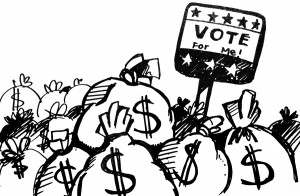Paying Congress more will not solve problems
It was a statement that only a Congressman who isn’t up for reelection could make.
“I think the American people should know that the members of Congress are underpaid,” said Representative James Moran, a Democrat from Virginia who is retiring at the end of this session, in an interview with CQ Roll Call.
For background, consider that many are calling the 113th Congress the most unproductive in years. As of last December, the last Congress to pass fewer bills than this one adjourned in 1947.
The latest Gallup poll put Congressional approval at 15 percent. As a friend of mine who is running for Congress in November likes to put it, “I want to know what 15 percent of Americans think Congress is doing a good job.”
And these people deserve a pay raise? According to some, the answer is yes. When the blogosphere lit up with those eager to slam Moran’s foolish suggestion, some jumped to his defense. The most basic argument seems to be that he misspoke — the legislative change that Moran ended up pushing yesterday (which failed miserably) was to give members a per diem (or stipend) for each day they spend in Washington.
Moran’s call for a pay raise also started a more interesting conversation, one that doesn’t seem to be getting its due time in the sun.
According to Salon writer Alex Pareene, Congress’s meager pay is enough to incentivize them to both take heavy donations that take advantage of lax campaign finance laws and to quit their jobs early to get richer in the private sector.
“And in a world where campaign finance regulations are constantly getting gutted by the courts, paying members a fortune and letting them fund their own campaigns is basically halfway to public financing of elections,” Pareene said.
Pareene is right on the fact, but wrong on the argument. Why don’t we just cut to the chase and get serious about campaign finance reform? Even Moran seemed to acknowledge in his interview that one of the big reasons why a pay raise for Congress might be so unpopular is because Congress isn’t perceived as poor — and anyone that sees Super Pac’s loaded with cash from billionaires such as the Koch brothers and Sheldon Adelson can’t be blamed for this misperception.
The problem with campaign finance reform is that the U.S. is quickly running in the wrong direction. Last week, the Supreme Court struck down overall limits on the amount donors can give to political parties and candidates. The limit an individual can give to a single candidate ($2,600) is still law, but the decision struck down the limit on how many $2,600 gifts an individual can give out.
The lesson that folks such as Moran and Pareene seem to have drawn from this decision is a rather nihilist one — namely, that campaign finance reform is hopeless and that the solution to ending corruption is to simply pay our elected officials more from the public purse. Maybe then, they say, members of Congress will be less beholden to Super PAC’s and special interest groups.
Moran and Pareene should watch a few episodes of House of Cards. U.S. elected officials and journalists shouldn’t let another misguided decision from the Supreme Court derail the quest to make politics less corrupt. Paying Congress more is a feel-good and temporary solution, and anyone that thinks increasing Congress’s travel stipend is a meaningful solution to corruption should have his or her head examined.
Moran’s call is a distraction and one that should be ignored. Unfortunately, it seems there were more articles, blog posts and tweets making fun of him than there were articles lambasting the Supreme Court for striking another blow to democracy that was McCutcheon v. FEC, the above-discussed decision that was handed down last week.
Though it’s true that calls for increased pay during one of the most unproductive Congressional sessions ever makes for juicier headlines, Supreme Court decisions that continue to expand the role of money in politics are far more deadly for democracy. Moran’s solution is a wolf in sheep’s clothing that funnels money into politics in a different fashion — the solution is to get rid of it altogether.
Nathaniel Haas is a sophomore majoring in economics and political science. His column, “State of the Union,” runs Thursdays.


